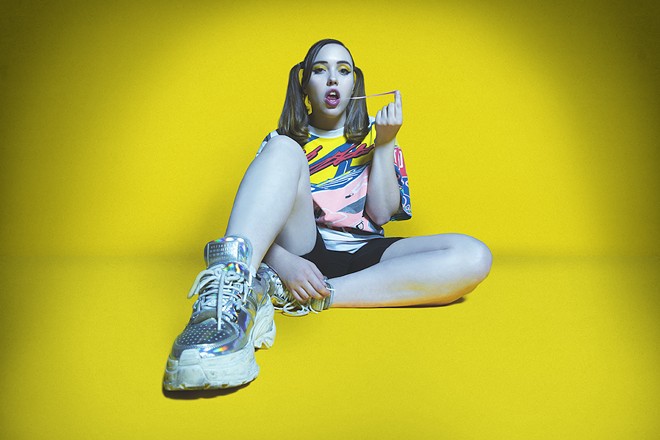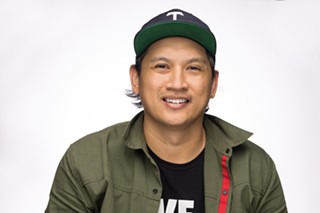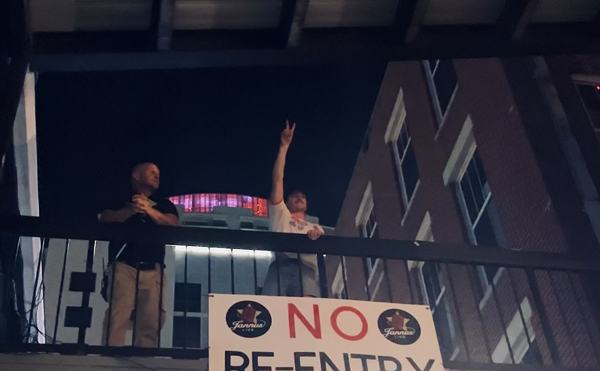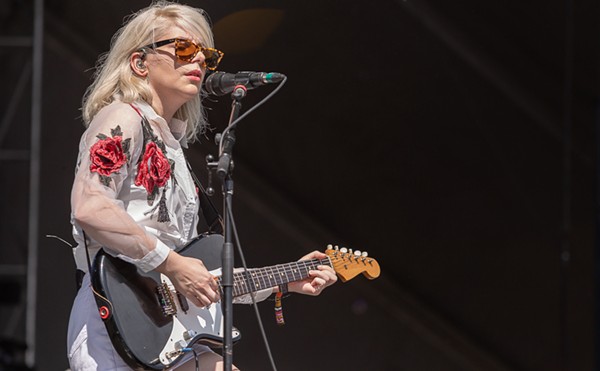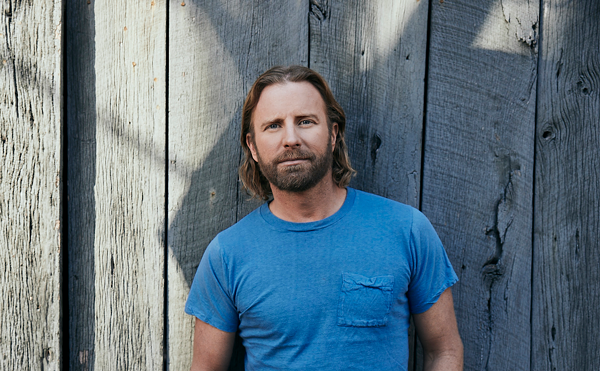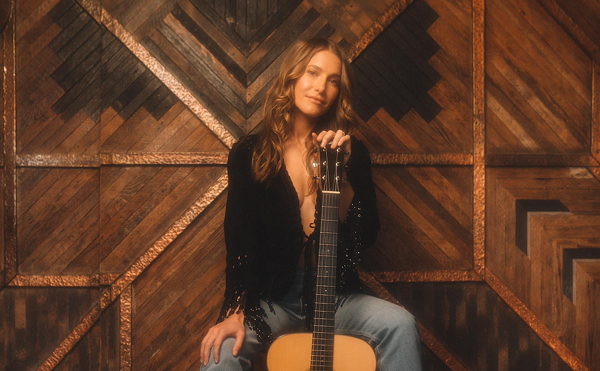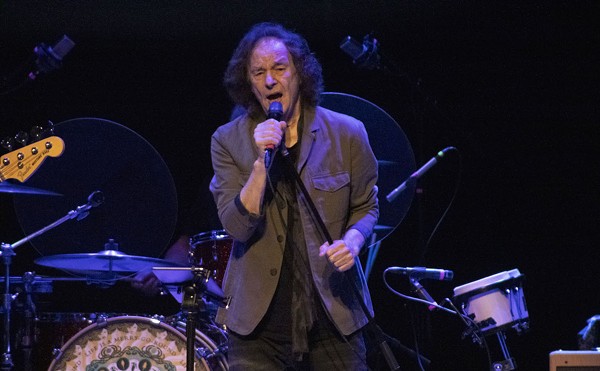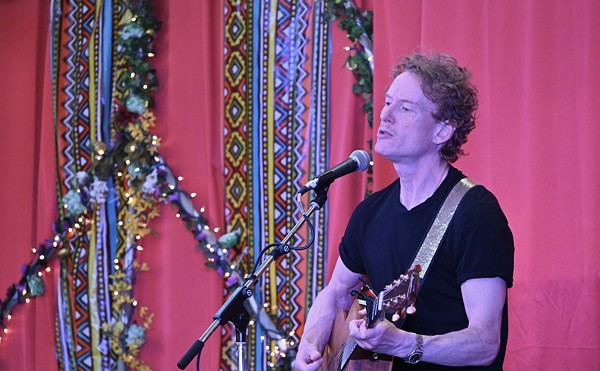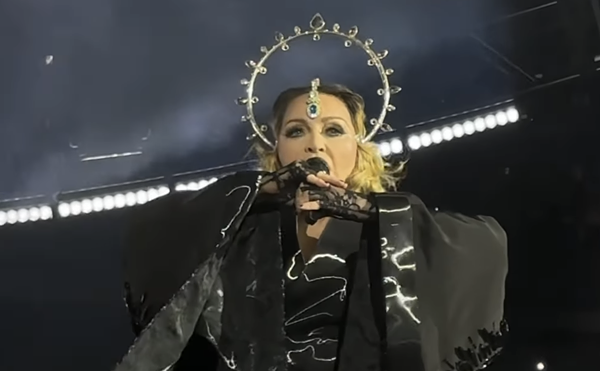“But you can’t lock your phone,” Allison laughed as she told Creative Loafing Tampa Bay about her routine on tour. “So if I listen to it at night, I can’t shut my phone, which is terrible for the battery, but the video is called ‘Rain in Woods + Tibetan bowls’—that’s the best one.”
Allison’s fans have undoubtedly spent many of their own evenings with Soccer Mommy’s 2020 album, color theory, a devastatingly piercing and personal album with even more of the emotional weight of the band’s breakthrough effort (Clean, 2018) juxtaposed with a more experimental—and bright—approach to composition. When she hits Florida stages after an opening set from Los Angeles band Peel Dream Magazine, it’ll be the first time many of her fans will be seeing the songs performed outside of a livestream.
Over the course of 20 minutes, Allison talked about how she keeps her body’s battery charged on the road, how color theory songs have aged and revealed that Soccer Mommy already has a new album in the bag.
Read our Q&A below.
You're about a week away from kicking off this next leg, and it's been about four months since you ended the last one at the Cannery Ballroom. Does the Tibetan bowl come out with you on tour?
No, I do love to listen to this specific YouTube thing that I'll play sometimes—but no.
So you have a YouTube playlist of Tibetan bowl and rain sounds and stuff.
Yeah! The best one is a really hard thing for me because it's only on YouTube, and it's like a 10-hour loop.
So you have to get a YouTube premium so there's no commercials.
Yeah, I don't, I don't have it though. I probably should, but it doesn't have ads on it. But you can't lock your phone. So if I listen to it at night, I can't shut my phone, which is terrible for the battery, but it's called “Rain in Woods + Tibetan bowls”—that's the best one.
You need a Kanye West-like stem player just for that YouTube video.
Actually, we have one. Julian, my boyfriend is in the band, he got one and honestly they're honestly they're pretty cool.
Everyone’s knocking it, but it's kind of a cool piece of technology because you're taking apart an entire composition, right?
It works pretty well for rap music because it's kind of its kind of setup into samples, beats, voice—it basically has like four different sections that it splits everything into. And for stuff that doesn't have a lot of weird extra shit going on, it honestly separates stuff really well. So it's kind of it's kind of cool and fun to fuck around with.
That's awesome. I want to riff on that in a second. But you mentioned Julian, so is the band still Julian Powell on guitar? Rollum Haas on drums, and then Rodrigo Avendano on guitar and synth?
Yeah and Nick Widener is on bass now.
You mentioned the stem player and being able to kind of isolate the drum sounds, I know that drum sounds were a big part of a lot of the songs or some of the songs on color theory. Has listening to the stem player and playing with that album, and that piece of technology over the last few weeks inspired any new studio ideas for you?
Well, we already actually recorded an album. I can't obviously disclose any more information, but we've got a record ready to go. It's exciting.
OK, so you don't want to say anything else besides that, right?
Yeah, not really, not gonna ruin the fun.
That's awesome. Congratulations. That's really awesome.
Thank you.
Obviously the pandemic is a really weird thing. So we're still talking about color theory, but I know you're really proud of the album and you know, as long as it's been around. You wrote ‘yellow is the color of her eyes’ about your mom being sick at home since you were 12, and homesickness in general—do you still kind of deal with those homesick feelings and feeling bad about leaving your mom and stuff like that, or is that something you've worked through?
I get homesick all the time on the road for thousands of reasons. For me, that song specifically was working out getting over avoidance a little bit and wanting to be more present. Not the song specifically, but just everything I was dealing with in my life time and all that stuff and confronting you know, those kinds of feelings definitely helped me be more present about what I have, and grateful. Stuff I think that it definitely helps, I guess. I still deal with feelings of homesickness and everything, but it's definitely not as much underlying things.
You told NME right before this pandemic that, “I want the record to feel like a relic from the past that’s been damaged and degraded with age” and obviously it was not intended, but it's been some time now since the record came out and kind of aged on its own. You mentioned having recorded a new album. What's your relationship with color theory right now as you take it on this next leg? Is it getting to the point where you're ready to retire some songs? Or are you still kind of enjoying the routine of playing some of these and being able to get lost in them every now and then on stage?
Honestly, when we were first about to start touring again I was kind of wondering if I was about to be sick of this shit a little bit. Just because usually by the time that we're about to start a new album, I'm tired of playing the songs—and I had been playing them solo through the pandemic a little bit on lives and stuff like that—but honestly, just getting to actually work them out with the band and start playing shows again has been really fun. I feel happy playing them, and I don't feel tired playing them and I honestly feel like we're still occasionally changing things up a little bit. So it's still definitely fun for me, and I'm not sick of them. But I'm also really excited to play the new songs. I'm excited to play both of them because obviously the goal is to be able to play longer sets and be able to play more material and just kind of pick your favorites because there are definitely ones I like more than others—just playing live, nothing to do with the songwriting or anything. I'm definitely gonna keep playing a lot of other color theory stuff and keep playing some clean stuff as well. There's songs we brought back that we haven't played in a while.
You mentioned being able to play longer sets, and I referenced the Cannery show, and I think in this tour, you get to play some smaller rooms again. There's not a lotta surprises anymore in live music and setlists and stuff just because of the internet. But can you talk a little bit about the arc of the setlist for this leg and what you're hoping to bring your listeners as far as sequencing for the set?
We've kind of been playing mostly the same kind of order mostly because we play with a bunch of different tunings. And when we're writing out those setlists it's a very complex balance of who's in what tuning here and who's in what tuning there—just to make it easier for everyone to push through stuff. Usually we only mix the setlist up a little bit. Just kind of switching around certain sections that are in good tunings for tuning changes for everybody. Most of color theory will get played. I think there's only two songs that we don't play—"stain" or "up the walls"—but we play pretty much the rest of the record. We'll definitely play some of the big songs from clean, of course. And maybe we'll even throw out a new one, who knows who knows what people are gonna catch.
Right on. This one's kind of technical but you mentioned all the tunings and stuff and a pretty substantial band, are you having a tour with a tech or is it like a tour manager/tech situation? Are you just doing tech stuff yourself?
We had a tech for the first time on the last run, which was awesome. But our guy couldn't do this tour, and we ended up just kind of being like, 'You know what we can deal with it for one more tour and then we can find somebody,' so we're not gonna have a tech but we're just gonna bring a lot of guitars, all in their different tunings and be switching them ourselves. We used to do that, and we do it for fly-in shows anyway. I think it'll be fine. We kind of stick to mostly two or three tunings, so you don't need that many guitars to switch through.
Tour is a weird thing because all of a sudden you're on a lot of other people's time, sharing space and stuff. Is it still possible to take care of yourself properly on the road? Have you figured out that routine?
Yeah, I think I have. I didn't always. I think that something that's extremely important on tour is getting sleep when you can and not eating a bunch of junk food and stuff—like try to get nutrients and vitamins. And not drinking a ton; if you drink a bunch every night, you're gonna have trouble sleeping, probably, and then you're gonna be tired the whole next day. That stuff just kind of doesn't only weigh on you. When people are in a bad mood, and you're all stuck in like a band together for six hours driving somewhere, and everybody's grumpy, it's not fun for anybody. I think just trying to keep your keep your spirits up prioritizing feeling good every day, and getting your sleep in when you can—obviously there are times when you can't get that much sleep—but when you just kind of end up like staying up just to party or watch TV for no reason, to each his own I guess, but you don't get time to make it up.
For a little while you had you were talking about there was this long stretch of time where you weren't sleeping and kind of hallucinating as a result. Is it safe to say that, based on that last question, you've been able to find some of that rest and calm that maybe escaped you in the past?
Definitely. I mean, sleep deprivation is not good for you, obviously. And it just kind of piles on itself because you get insomnia and stuff. I think just trying to eliminate stuff that's not helping you sleep and work on your own like anxieties and stuff is a factor, and it definitely helps.
Right on. I don't know if I want to breach too much into what the new album is about. But your writing also fulfills this deep-seated need for self-reflection, to be harsh and honest about “flaws” so you can better them—but at the same time, outside of some of color theory, usually, writing doesn’t actually change anything for you. Does that still hold true? If so, what have your new songs done for you lately?...writing the song is never something that's just going to fix problems in my life.
tweet this
I guess it's not like I sit down and I start writing and suddenly I'm realizing all these things. It's more like, I get inspiration from writing my reflective thoughts, basically. I think about things and come to conclusions about life and come to realizations. I spend a lot of time just kind of running through a lot in my brain. It definitely gives me inspiration to put that down and try to basically take all these thoughts and weave them together and find a conclusion, so that I can stop wondering, and trying to find out how I feel on things and get to my destination. It's definitely something that comes a lot from myself and things I deal with, but I also think that writing the song is never something that's just going to fix problems in my life—I'm sure it's not like that for anyone else, either. Just coming to an end or getting all your thoughts down on a page doesn't fix whatever you've been thinking about or fix your anxieties or any of that stuff. Having self reflection lets you be mindful and aware of what's going on in your head, basically.
And sorry for this meandering question, but it kind of ends around “bloodstream.” I love that story you tell about playing your toy guitar for your neighbors and them putting quarters in the cup. Obviously there's this devastating arc that ends with your senior year being ill with anxiety—maybe over not knowing what you wanted to do with your life, knowing you were leaving, and being scared—it got worse when you left home and were alone. I’m a parent now, and my heart breaks to think about someone’s kid going through that.
And then we get to “bloodstream” where you're working through these things and putting them on a record, and they're these vivid images of you and using pain to stop your brain. I take it you've kind of figured that out now, but was there anything different you would have done in that time of your life like to kind of work on that situation? I guess I'm kind of asking in a non-musical sense but maybe from the perspective of a fan going through something like that someone or even me as a parent maybe recognizing that in my kid and trying to help out if they could?
It depends, with some of it, I think that some of the stuff—like, for example, going away to college and feeling lost and feeling confused and stuff—that's kind of just the thing most people have to go through and you have to come out the other side. You have to kind of just fight your way through all this confusion and deal with all that—the only thing that does anything is time. Because it's just change, and change is difficult. No one loves change, like big change in their life, regardless of whether it's going to be positive in the end or negative; it's jarring. Even with people excited about going to college and stuff, it's lonely at first for everybody. No one meets their best friend the first day, no one has the most amazing first week at school. I don't think that happens to anybody.
I think when people are struggling with mental health issues on top of it and stuff, people who are around that, I think that being able to just kind of recognize, I guess, when somebody's kind of dealing with something and be sensitive to that, but also just be available. Don't just let them just leave them alone. I think wallowing is one of the worst things you can ever do for yourself. Sitting around and wallowing but your problems is never gonna make you feel better. It's just gonna make you feel worse. And, you know, distractions can be a wonderful thing.
I know we're out of time here and I just want to get a picture of where I'm talking to you from. I don't know if you're in Nashville, but did your New Year's resolution for more Gothic home decor pan out?
Oh, yeah. I actually moved into a bigger place so I've been doing a lot of shopping for decor. I did not have enough. You never have enough, really. So I'm still going but it's off to a good start.
Right on. So still a work in progress but definitely more Gothic than before color theory for sure.
Oh, yeah.
OK. Alright. Well, we'll look for the black metal album then. Thanks for making time for me today.
Yeah, of course.

